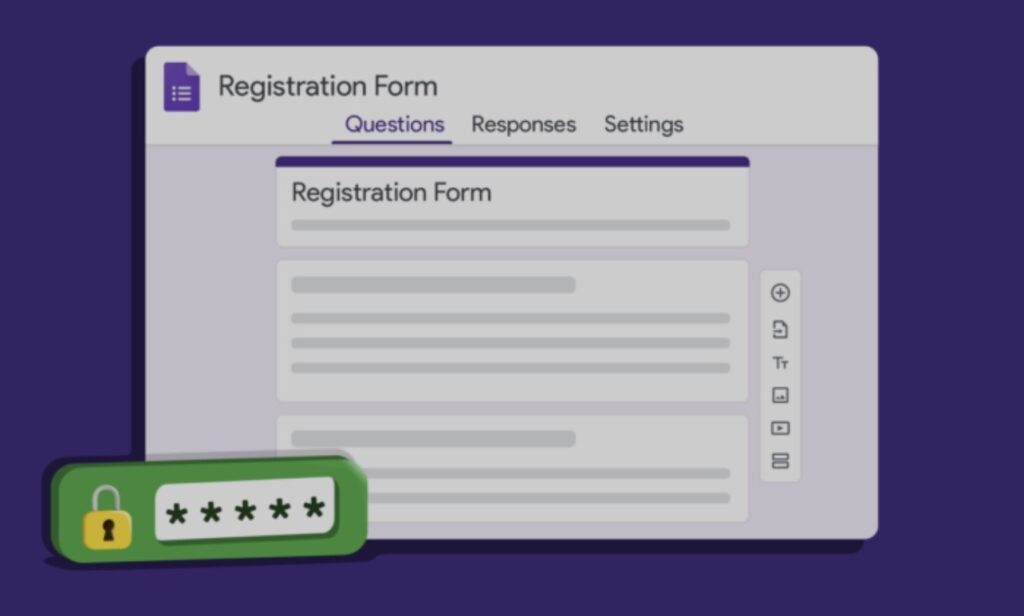If a record has just been discovered, the most important step is to stay calm and get the exact details in writing before saying too much let go through the following steps to prevent being a victim of fake google forms.

Introduction
Google Forms is one of the tools in Google Drive which is less known, but you can use to create online forms that people can fill out anytime. In Ghana, for instance, many small business owners and schools use Google Forms to collect customer feedback or student information. You can also use google forms to plan local events or take surveys. However, some scammers have recently started using fake Google Forms to steal people’s details most especially the youth so this guide will help you detect and avoid such scams.
why do scammers choose google forms?
Malicious actors always try to find new ways to bypass email security and make scams look real, and in Ghana, some scum now think Google Forms because it’s free and since we like free the most, and trusted by many people online.
- Threat actors can start campaigns at scale for free, potentially yielding a high return on investment.
- Users’ trust in it raises the likelihood that victims will think the Google Form they’re being sent or redirected to is authentic.
- A legitimate service, which means that conventional email security measures frequently bypass rogue Google Forms and connections to malicious forms.
- The tool’s ease of use benefits both users and cybercriminals, as it allows them to run convincing phishing attacks with minimal work and understanding.
- The fact that Google Forms communications are encrypted with TLS, which may make it more difficult for security tools to peer in and look for any malicious activity, is another tactic used by cybercriminals.
- Likewise, the solution frequently makes use of dynamic URLs, which could make it difficult for certain email security filters to identify malicious forms.
How google form attack look like?
While they use different ways, most Google Forms scams aim to trick Ghanaians into revealing personal or financial details let see how this common tactics works:
1.Forms associated with phishing
Scummers often build fake Google Forms that mimic banks, payment pages, universities, or social sites because Google-hosted links bypass many filters in Ghana these malicious forms are usually sent via phishing emails (sometimes from compromised accounts) with the aim of stealing logins, bank details, or other personal information.
- Your log-ins may be harvested, which could lead to identity theft and account takeover.
- Take control of these accounts, deplete their cash, or perpetrate payment fraud by stealing your card information or banking or crypto information.
- convince you to click on a link in the malicious Google Form that will take you to a website where malware will be secretly installed on your computer.
The Scam’s Operation

1.Phishing emails
These scams often start with phishing emails that look official as a Ghanaian, they might appear to come from a bank, a popular delivery company in Ghana, or even a school administrator. They design all that to trick you into thinking the message is genuine.
This is the part that makes the these scams convincing is how real the emails look. You will get a message asking you to reset your password, and to confirm your details, or fix a supposed security issue just like messages people in Ghana often get claiming to be from their bank or mobile money provider, urging quick action.
Even worse the phishing email can come from a friend’s or colleague’s real account if their accounts was hacked, so the message looks authentic and you can’t rely only on checking the sender address to spot the scam.
The email or a social-media DM will usually include a link to a Google Form the scam’s second stage and the form is often styled to look like a real site (your bank, MoMo provider, or employer), so people may easily be fooled thinking it legit.
The form might ask for sensitive details, link to malware, or list a contact number and because it’s hosted on Google’s servers, mostly we Ghanaians think it’s safe (but it can still be malicious).
Scammers can close and reopen Google Forms under many different URLs easily, making them hard for security tools to catch and because forms are free to create, fraudsters can churn out dozens without spending.
How can you prevent or go against that as soon as possible?

1.Avoid unknown or strange contact and friend requests:
Most scams like this can be avoided by using basic precautions. Avoid unexpected messages, friend requests, or password resets you didn’t start yourself. In Ghana, Don’t panic call your bank or workplace directly using their official number instead of trusting the information in a suspicious email or message.
2.Don’t enter payment or login information into google forms:
In general, never type your payment or login details into a Google Form even if it looks neat or professional. Legit banks or companies in Ghana won’t use a form with a docs.google.com link for such details, and those forms usually have simple “Submit” or “Clear” buttons without any secure design.
3.Never submit password to anyone:
Also, most real Google Forms show a small note at the bottom saying “Never submit passwords” or “This content is neither created nor endorsed by Google.” In Ghana, always check for these signs even if the form link looks like it came from a trusted company or a known contact.
Additionally, contact the source directly if you are being requested for critical information.
4.Act fast and report:
If you suspect a scam, use the Report button found at the bottom of any Google Form. If you already entered your details before noticing it’s fake, quickly change your passwords and alert whoever manages the affected account whether it’s your bank, school, or workplace so they can help secure it.
FAQs
1. How can I tell if a Google Form is fake in Ghana?
Check the bottom of the form real forms show messages like “Never submit passwords” or “Not endorsed by Google.” Also, be careful if the form asks for sensitive details like MoMo PINs, bank info, or passwords.
2. What should I do if I already entered my information into a fake form?
Try changing your passwords immediately, contact your bank or MoMo provider, and report the form using the “Report”button at the bottom. It’s also wise to alert your friends or colleagues so they don’t fall for the same scam.
Conclusion
Being aware of scams like fake Google Forms is the first step to staying protected. Always keep your phone and computer software updated this won’t always flag every fake form, but it can help you detect and block many harmful links that scammers, especially in Ghana, use to trick people online. Learn more in our article: Are Passkeys Safe? How They Work in the Modern World.”














